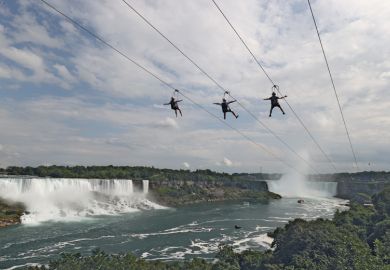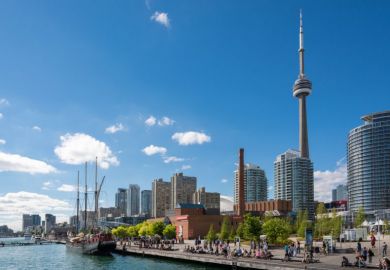The fall in demand among international students triggered by a cap on Canadian visas could have a “far-reaching and long-lasting effect”, it has been warned.
Amid concerns over pressure on housing and healthcare, the federal government introduced a cap that would reduce the number of new study permits from 436,600 last year to 292,000 in 2024.
However, ApplyBoard has warned that the cap, along with “high-profile” policy challenges such as higher wealth requirements and new working regulations, have shifted international students’ outlook on Canada.
New analysis from the admissions company has found that the cap may have “contributed to chilling demand” so much that the government’s projections for 2024 will not be met.
A total of 127,700 new study permits were processed by Immigration, Refugees and Citizenship Canada (IRCC) between April and June – 54 per cent fewer than during the same period last year.
And ApplyBoard projects that the country will process 39 per cent fewer new study permits across the full year than it did in 2023.
If the current approval rate holds, this means that just 231,000 new study permits would be approved by the end of the year – a fall of 47 per cent on the 2023 total, and well below the cap.
“This shift in demand may have a far-reaching and long-lasting effect, as international students help to drive our global economy,” it warns.
“They spur innovation and support millions of jobs, both in their home countries and study destinations.”
Universities Canada recently warned of “collateral damage” from the cap, which has created uncertainty for many international students.
“There’s every possibility that it’s going to be even worse than we fear,” Gabriel Miller, president of Universities Canada, told local media.
In announcing different caps for different provinces, the Trudeau administration had hoped to shift enrolment from populated cities to more rural areas.
The analysis has found that much fewer applications are being processed for Ontario and British Columbia, but areas such as Alberta, Newfoundland and Saskatchewan have also witnessed sizeable drops.
ApplyBoard warns that this suggests student demand has not pivoted to other Canadian provinces but instead has likely “shifted towards other destination countries entirely”.
“While Canada is still perceived as a safe and high-quality destination, this data shows that Canada’s ability to attract new students is capable of changing quickly, causing ripple effects across the international education sector,” it adds.
The report did find that study permit processing times were particularly slow between April and June but have since increased. The IRCC figures show that the average processing time per application was seven weeks in August – down from 15 weeks in May.
The report found that if processing times improve across the next two quarters, more study permits may be processed than it has estimated. And ApplyBoard says faster processing times would also enable international students to plan their time abroad more proactively.
Register to continue
Why register?
- Registration is free and only takes a moment
- Once registered, you can read 3 articles a month
- Sign up for our newsletter
Subscribe
Or subscribe for unlimited access to:
- Unlimited access to news, views, insights & reviews
- Digital editions
- Digital access to THE’s university and college rankings analysis
Already registered or a current subscriber?








